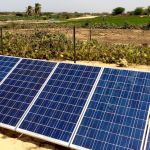How to Stop Wasting Food … and Feed the World
Humans have to increase food production by 70 percent if we hope to feed a global population expected to reach 9 billion by 2050. But our global village is in a frenzy, in terms of shifting development goals in an effort to create an equal society. Then there is climate change. In the future, as little as 5 percent of all land will be devoted to agriculture. So how will we be able to feed the expanding population?
Typically one would imagine that increasing productivity is the only solution. However, preventing food wastage from existing yields can dramatically increase food supply. Roughly one-third of the food produced in the world for human consumption every year – approximately 1.3 billion tons – gets lost or wasted, which roughly amounts to US. $990 billion. The world currently produces enough food to feed 7 billion people – approximately the current population – but we still see food shortages.
Loss of produce due to lack of transportation and preservation facilities is a challenge for any farmer. Over 40 percent of produce is spoiled at various stages of the food supply chain. It is heartbreaking to see produce, grown over months with so much effort and care, going to waste. Adding to the woe, 95 percent of research is directed toward increasing productivity rather than reduction in post-harvest losses.
At Science for Society (S4S) Techno Services, we engineer sustainable methods to reduce food wastage through environmentally friendly, low-cost technologies. Visually imperfect produce, which doesn’t fetch market price, can be dehydrated using our patented solar conduction dryer. Unlike other drying technologies which require fuel or electricity, our UN award-winning technology retains 85-95 percent of the food’s nutrition and increases the shelf life of perishable produce by six to 12 months, with minimal carbon footprint. With zero operating cost, this technology ensures a 25-35 percent increase in average yearly income to Indian farmers. Our unique technology has been recognized by USAID, FICCI, the Bill and Melinda Gates Foundation, UN, Bayer and other reputable organizations.
Due to economic stress, a quarter of a million farmers committed suicide in India from 1995-2010. Even more farmers switch their occupation every year due to low income. The two major reasons attributed are low commodity prices and post-harvest losses of food. Our technology has the potential to reduce farmer suicide by providing additional income to the farmers and reducing food wastage. Employment opportunities are also created by establishing business units that can benefit from economies of scale in terms of manufacturing, marketing, sales, distribution, maintenance of dryers and market linkage for dehydrated products. This is done by DesiVDesi, a brand owned by S4S, which buys processed food from farmers, acting as an aggregator, and brings their dehydrated produce to market. Thus, we create a sustainable supply-chain network and also remove price volatility.
DesiVDesi brings chemical-free, preserved food to cities from the farms, providing quality nutrients and ensuring fair trade practices along with a sustainable supply of food. We have partnered with 1,200-plus farmer cooperatives across eight countries to process farm-fresh ingredients and bring them to retail stores.
The urban population is shifting toward convenient foods. With a perennial supply of fruits and vegetables, DesiVDesi products are available without any preservatives or additives.
The size of the global processed food market is estimated at U.S. $3.2 trillion with 15 percent year-over-year growth. Also, 80 percent of agricultural products in developed countries are processed and packaged. The dried and preserved vegetables market is expected to grow at a compound annual growth rate of 16 percent by the year 2020.
Supportive agro-climatic conditions, cost competitiveness and government support are some of the key factors which will drive the growth of this industry. World demand for dried and dehydrated vegetables is to increase over the long term as industrialized countries develop new markets and end-uses for these products. Thus, we see a lot of potential in DesiVDesi.
With 10 SKUs currently in India, our products are present in 100 shops in Mumbai and available online across India. And, having done extensive groundwork, we understand the impact of our ideas on local communities and the scope for scale in different countries. We aim to expand globally starting in 2018.
DesiVDesi provides a financially viable business model to farmers and self-help groups through intervention of sustainable and innovative technology. We hope to not only reduce poverty in the agriculture sector, but help eliminate hunger and overcome malnutrition.
Nidhi Pant co-founded DesiVDesi at Science for Society Techno Services.
Photo of Science for Society (S4S) Techno Services’ solar conduction dryer, courtesy of S4S.
- Categories
- Agriculture, Technology



